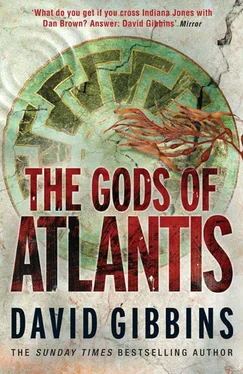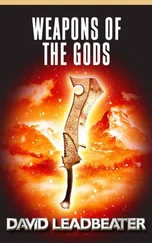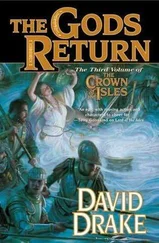David Gibbins - The Gods of Atlantis
Здесь есть возможность читать онлайн «David Gibbins - The Gods of Atlantis» весь текст электронной книги совершенно бесплатно (целиком полную версию без сокращений). В некоторых случаях можно слушать аудио, скачать через торрент в формате fb2 и присутствует краткое содержание. Жанр: Прочие приключения, на английском языке. Описание произведения, (предисловие) а так же отзывы посетителей доступны на портале библиотеки ЛибКат.
- Название:The Gods of Atlantis
- Автор:
- Жанр:
- Год:неизвестен
- ISBN:нет данных
- Рейтинг книги:3 / 5. Голосов: 1
-
Избранное:Добавить в избранное
- Отзывы:
-
Ваша оценка:
- 60
- 1
- 2
- 3
- 4
- 5
The Gods of Atlantis: краткое содержание, описание и аннотация
Предлагаем к чтению аннотацию, описание, краткое содержание или предисловие (зависит от того, что написал сам автор книги «The Gods of Atlantis»). Если вы не нашли необходимую информацию о книге — напишите в комментариях, мы постараемся отыскать её.
The Gods of Atlantis — читать онлайн бесплатно полную книгу (весь текст) целиком
Ниже представлен текст книги, разбитый по страницам. Система сохранения места последней прочитанной страницы, позволяет с удобством читать онлайн бесплатно книгу «The Gods of Atlantis», без необходимости каждый раз заново искать на чём Вы остановились. Поставьте закладку, и сможете в любой момент перейти на страницу, на которой закончили чтение.
Интервал:
Закладка:
White glanced at the co-pilot, who had been looking at him expectantly, and nodded at him. ‘Altering course now.’ He turned the wheel smoothly, pushing the control column forward and pressing the left rudder pedal. As the aircraft banked to port, he looked out and saw the northern tip of the island, and ahead of that the turquoise waters of the reefs that covered the outer banks of the Bahamas. He checked the mixture controls for each of the four engines to make sure they were on auto-rich, then levelled out at a compass bearing of thirty-five degress and pitched the plane forward into a shallow dive. He pulled the throttle levers back to reduce the airspeed, then let go of the levers and blew on his nose to equalize the pressure in his ears as they dropped in altitude. At eight hundred feet he began to level off, edging the throttle levers forward until the airspeed stabilized at two hundred and thirty knots at an altitude of five hundred feet. He trimmed the aircraft until she was slightly nose-heavy, then scanned the instruments: oil pressure, fuel pressure, oil temperature, cylinder head temperature, all good. He glanced again at the co-pilot. ‘Right. I’m taking a breather. She’s yours for five minutes.’
Flight Lieutenant Bill Parker nodded. ‘Taking over the controls now.’
White slowly let his feet up from the pedals, feeling the boards stay in place where the co-pilot had his own pedals in position, and then let go of the control column. He shifted his legs around, getting the circulation going again, and stretched his arms as far as they could go against the glass panes of the cockpit above him. He breathed in deeply a few times. He desperately needed a cigarette. Smoking was not allowed in RAF bombers, and the Liberator in particular always smelled strongly of fumes; there were horror stories of US crews lighting up and their B-24s igniting in a fireball. The craving usually kicked in about twenty minutes into an operation, and was why he had never taken the Benzedrine tablet that was given to them with their last meal before a sortie over Europe; the craving kept him alert until they were over enemy territory and the adrenalin and fear took over.
There was no fear now, but he was still on edge. It seemed odd, five weeks after the death of Hitler, being in an aircraft that was all bombed up on its final run in to a target, albeit a decommissioned minesweeper that had been anchored for depth-charge and strafing practice off the north coast of the Bahamas. For him, the end of the war had been a disconcerting experience altogether, nothing like his father’s memory of the moment of the 1918 Armistice, that instant when the guns stopped firing and there was a sudden shocking end to it all. They had flown their last bombing operation six weeks earlier, in April, as the lead pathfinder aircraft in a five-hundred-bomber raid destined for Bremen that had been diverted to destroy an area of forest infiltrated by remnant German troops near the concentration camp of Bergen-Belsen. Their final op two days after that had been dropping relief supplies to a medical unit trying to help survivors of the camp. It should have felt good, a mission bringing succour rather than destruction, but it had not. Earlier in the war, White had stayed with his sister at Stechford in Birmingham during a devastating German raid. The experience had steeled him, had taught him about total war. It meant he knew exactly the effect of the bombs that he rained down night after night on the cities of Germany. He had become an instrument of destruction, the reason why the humanitarian mission was so jarring. And seeing the smouldering fires of the concentration camp had shown him what they had failed to prevent in six long years of war, an obscenity that could only haunt those whose bombs could have fallen years before on the camps and the railheads and perhaps thwarted the worst crime in history.
At the back of every serviceman’s mind in Europe that summer had been the continuing war against Japan, and it had come as a relief when his crew and three others from his pathfinder group were selected for secret operations in the Pacific. That final op flying relief supplies had filled him with a terrible apprehension about his life after the war, a future he had never allowed himself to contemplate; even the few snatched days of leave with his wife and child in their little cottage had been about the present, not the future, and the sheer happiness he had experienced then had been contingent on the war itself protecting him from reflecting on what he had become and what he had done.
On the night of VE Day, a senior US Air Force intelligence officer had arrived at their base in Lincolnshire and shown them the latest newsreels from the Far East. They had seen footage of the jungle war being fought by the British and Indian armies in Burma and the Australians in New Guinea, and the horrendous island battles of the Americans leading up to the assault of Okinawa. They had seen kamikaze attacks on US and British ships in the Pacific. The Germans had fought with savage professionalism, but not like that. The officer had warned that as the Allies reached the Japanese mainland it would become a war of attrition. He said the pathfinder crews had been chosen for their expertise at precision targeting, but also because they had all dropped the ‘Tallboy’ and ‘Grand Slam’ bombs, the huge 12,000- and 22,000-pound bombs that had been used to destroy the U-boat pens and fortified sites across Germany. He told them that the US had developed a new breed of battlefield weapon, bombs to be dropped behind the front line that could vaporize all life within a half-mile radius, far more powerful even than the Grand Slam. That was to be their new role, killing soldiers rather than civilians, destroying command and supply lines rather than cities. They and their US Air Force counterparts would be in action with the new battlefield bombs by the end of August, and would help to end the war against Japan before it sapped the lives of troops from Europe who were already being remustered to fight in the Far East.
White remembered the last time they had dropped a Tallboy, looking down at the inferno, watching the flash of the explosion and the ripple of the shock wave as it pulsed out through the flames. It had been the night of their last raid against Berlin, before they had left it to the Russians to finish the job. That was another reason why VE Day seemed like a hollow victory. They all knew that Heinrich Himmler had tried to negotiate with the Americans for the remnant Wehrmacht and SS to join the Western Allies against the Russians. There was the prospect of a war ahead that would make the final chapter of the struggle against Japan seem nothing more than a mopping-up operation. At Bomber Command HQ he had seen strategic planning maps drawn up with half the world in red, as if a tide of blood were seeping into the nooks and crannies of the borders of Europe and Asia, ready to drip through and burst the barriers. Already the death of Hitler seemed like a historical sideshow, a footnote on a stage that had expanded to encompass the entire world, where the forces of war set in motion by the last six years had taken on a momentum of their own, creating the prospect and the weapons of true apocalypse.
He banished the thought from his mind and settled back into his seat, concentrating on alleviating the discomfort of the next four hours as they hit their target and then flew back to Nassau. He looked at his coffee flask, and then at the piss tube beside his seat, remembering the last time he had used it and the howls of outrage from the waist gunner, who had been sunning himself in the open gunport and received a faceful in the slipstream. It was another small design glitch of the Liberator. He was pleased to have his old crew still with him, all except the tail gunner, who had been demobbed on compassionate grounds after his wife had been killed in one of the final V-2 rocket attacks on London. The US intelligence officer had said that the crew were to stay together for conversion training to the B-24 so that they would be most effective together in the new aircraft. The only problem was that the Lancaster had a crew of seven and the Liberator ten, so taking into account the absent rear gunner, there were four new faces: the co-pilot, the two waist gunners and the rear gunner, all of them experienced pathfinder crew. He had warmed to the rear gunner, Flight Sergeant Brown, when they had first met on the tarmac in Nassau and he had seen the ribbon and rosette of the Distinguished Flying Medal and bar above the silver pathfinder badge on Brown’s tunic. He was a cheeky chap, an English emigrant to Canada who had joined the RCAF three years ago, and the only one of them who had flown in Liberators before, in 1943, during a tour with Coastal Command. It was always good to have a cheerful rear gunner, given his chances of survival if the plane went down. The old Liberator hands called the pilot’s seat a coffin, from the shape of its armour-plated sides and back, leaving only the legs unprotected from below; but if anyone was in a coffin it was the rear gunner. The British Boulton Paul turret had no opening to allow him to bail out, and his only chance was to disengage himself from his harness and crawl back through the fuselage, a difficult enough task even while the plane was on the ground. The fire from a burning engine could wrap around the fuselage and cook the rear gunner alive. White had watched many times on raids over Europe as turrets had broken free from disintegrating bombers and fallen ten thousand feet or more, the gunners trapped inside. He had sworn that if he were ever to order his crew to bail out, he would remain on board and go down with the aircraft if he were unable to get the rear gunner out. It was a small pact with fate, and it meant that he always felt a particular affinity with the rear gunner. He clipped on his mask and spoke through the intercom. ‘How’s Tail-end Charlie?’
Читать дальшеИнтервал:
Закладка:
Похожие книги на «The Gods of Atlantis»
Представляем Вашему вниманию похожие книги на «The Gods of Atlantis» списком для выбора. Мы отобрали схожую по названию и смыслу литературу в надежде предоставить читателям больше вариантов отыскать новые, интересные, ещё непрочитанные произведения.
Обсуждение, отзывы о книге «The Gods of Atlantis» и просто собственные мнения читателей. Оставьте ваши комментарии, напишите, что Вы думаете о произведении, его смысле или главных героях. Укажите что конкретно понравилось, а что нет, и почему Вы так считаете.












